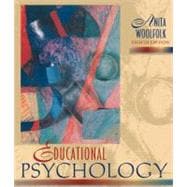
| Each chapter begins with "What Do You Think?" Overview | |
| Teachers' Casebook "What Would You Do?" and concludes with Summary | |
| Key Terms | |
| Teachers' Casebook "What Would They Do?" And Becoming a Professional | |
| Teachers, Teaching, and Educational Psychology | |
| What Is Good Teaching? | |
| The Ultimate Goal of Teaching: Lifelong Expert Learning | |
| The Role of Educational Psychology | |
| How This Book Can Help You Learn | |
| Students | |
| Cognitive Development and Language | |
| A Definition of Development | |
| Piaget's Theory of Cognitive Development | |
| Implications of Piaget's Theory for Teachers | |
| Vygotsky's Sociocultural Perspective | |
| Implications of Vygotsky's Theory for Teachers | |
| The Development of Language | |
| Personal, Social, and Emotional Development | |
| The Work of Erikson | |
| Understanding Ourselves and Others | |
| Moral Development | |
| Socialization: Family, Peers, and Teachers | |
| Challenges for Children | |
| Learner Differences | |
| Language and Labeling | |
| Individual Differences in Intelligence | |
| Ability Differences and Teaching | |
| Creativity, Giftedness, and Talent | |
| Cognitive and Learning Styles | |
| Changes in the Law: Integration, Mainstreaming, and Inclusion | |
| Prevalent Problems and Mild Disabilities | |
| Less Prevalent Problems and More Severe Disabilities | |
| Culture and Community | |
| Today's Multicultural Classrooms | |
| Social Class Differences | |
| Ethnic and Racial Differences | |
| Females and Males: Differences in the Classroom | |
| Language Differences in the Classroom | |
| Creating Culturally Compatible Classrooms | |
| Bringing It All Together: Teaching Every Student | |
| Learning | |
| Behavioral Views of Learning | |
| Understanding Learning | |
| Early Explanations of Learning: Contiguity and Classical Conditioning | |
| Operant Conditioning: Trying New Responses | |
| Applied Behavior Analysis | |
| Behavioral Approaches to Teaching and Management | |
| Recent Approaches: Self-Regulation and Cognitive Behavior Management | |
| Problems and Issues | |
| Cognitive Views of Learning | |
| Elements of the Cognitive Perspective | |
| The Information Processing Model of Memory | |
| Metacognition, Regulation, and Individual Differences | |
| Becoming Knowledgeable: Some Basic Principles | |
| Complex Cognitive Processes | |
| The Importance of Understanding | |
| Learning and Teaching about Concepts | |
| Problem Solving | |
| Becoming an Expert Student: Learning Strategies and Study Skills | |
| Teaching for Transfer | |
| Social Cognitive and Constructivist Views of Learning | |
| Social Processes in Learning | |
| Social Learning and Social Cognitive Theories | |
| Constructivism and Situated Learning | |
| Applications of Constructivist and Situated Perspectives on Learning | |
| Looking back on Learning | |
| Motivating | |
| Motivation: Issues and Explanations | |
| What Is Motivation? | |
| Four General Approaches to Motivation | |
| Goal Orientation and Motivation | |
| Interests and Emotions | |
| Self-Schemas | |
| Motivation, Teaching, and Learning | |
| Motivation to Learn in School | |
| On TARGETT for Learning | |
| Teacher Expectations | |
| Strategies to Encourage Motivation and Thoughtful Learning. | |
| Teaching | |
| Creating Learning Environments | |
| The Need for Organization | |
| Creating a Positive Learning Environment | |
| Creating a Learning Community | |
| Maintaining a Good Environment for Learning | |
| The Need for Communication | |
| Teaching for Learning | |
| The First Step: Planning | |
| Formats for Teaching | |
| Teacher Directed | |
| Focus on the Teacher | |
| Effective Teaching in Inclusive Classrooms | |
| Focus on the Subject: Teaching Reading, Mathematics, and Science | |
| Assessing | |
| Standardized Testing | |
| Evaluation, Measurement, and Assessment | |
| What Do Test Scores Mean? | |
| Types of Standardized Tests | |
| Issues in Standardized Testing | |
| New Directions in Standardized Testing | |
| Classroom Assessment and Grading | |
| Formative and Summative Assessment | |
| Getting the Most from Traditional Assessment Approaches | |
| Innovations in Assessment | |
| Effects of Grades and Grading on Students | |
| Grading and Reporting: Nuts and Bolts | |
| Table of Contents provided by Publisher. All Rights Reserved. |
The New copy of this book will include any supplemental materials advertised. Please check the title of the book to determine if it should include any access cards, study guides, lab manuals, CDs, etc.
The Used, Rental and eBook copies of this book are not guaranteed to include any supplemental materials. Typically, only the book itself is included. This is true even if the title states it includes any access cards, study guides, lab manuals, CDs, etc.